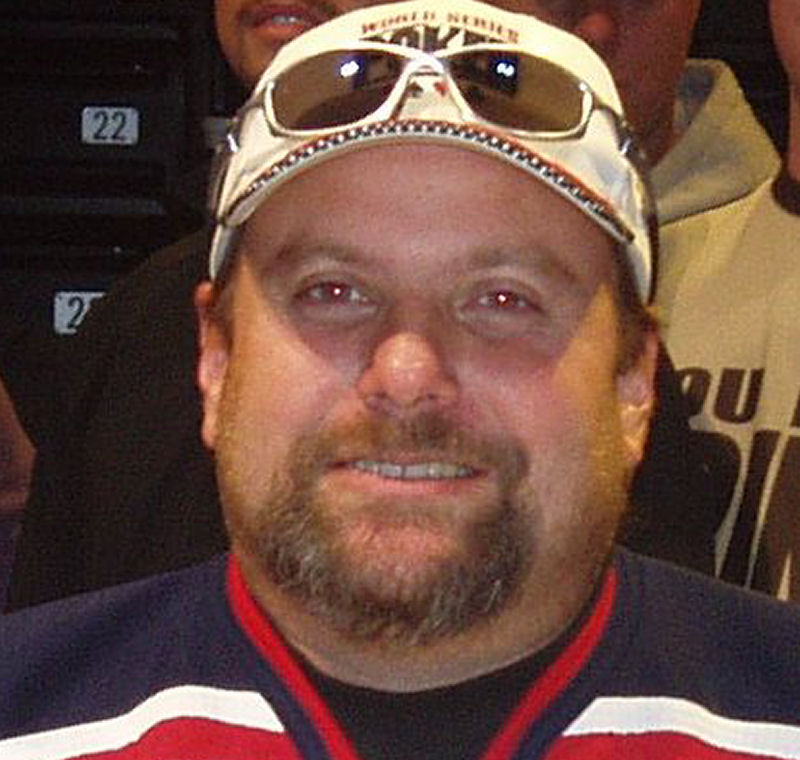 Thursday’s announcement by local and federal authorities of sentencing specifics for 18 participants in a major sportsbetting ring operated out of the Dallas-Ft. Worth area of Texas brought some interest to the poker world, since one of the 18 defendants in the case was Gregg Merkow (shown, left), a well-known Texas poker player whose tournament career alone boasts $1.5 million in career winnings, including a $570,000 score for winning a WSOP Circuit main event in Biloxi back in 2005.
Thursday’s announcement by local and federal authorities of sentencing specifics for 18 participants in a major sportsbetting ring operated out of the Dallas-Ft. Worth area of Texas brought some interest to the poker world, since one of the 18 defendants in the case was Gregg Merkow (shown, left), a well-known Texas poker player whose tournament career alone boasts $1.5 million in career winnings, including a $570,000 score for winning a WSOP Circuit main event in Biloxi back in 2005.
The sportsbetting ring targeted in the March, 2011 takedown was one of the largest ever in Texas. The United States Attorney’s Office for the Eastern District of Texas, part of the DOJ, claimed in its recent release that some $5.4 billion in gross wagers were funneled through more than two dozen offshore sites operated by the group and its alleged head, Albert Sydney Reed, Jr., 57, of Southlake, Texas, a DFW suburb.
The $5.4 billion in gross wagers was for a four-year period stretching from early 2007 through March of 2011, when 47 search warrants were executed against alleged members of the group. Since the ring’s activities were alleged to go back to at least 2002 and perhaps far earlier, it may have been a $10 billion betting group all told.
Merkow and others weren’t charged until sometime after June of 2012 in connection with the case, whose investigation strecthed all the way back to 2001, according to reports. The story was missed by poker outlets at the time, though it generated some local headlines in Texas. Instead, pieces of the story came out in dribs and drabs, with a 2012 KXAN piece revealing that Merkow himself had had “jewelry, numerous gold coins and $233,300 in cash” seized as part of more than $10 million seized in 2011 from the case’s various defendants.
Merkow claimed that the seizure was over-aggressive, and that he had records of all his poker-playing wins, losses and expenses, and that the IRS seized that paperwork as well. KXAN reported that Merkow and several others of the defendants had filed claims to try to get the seized assets returned, and Merkow apparently released that claims document to KXAN for that report, which excerpted the following:
“I am a professional poker player and have been for a number of years,” Merkow wrote in a claim. “In order to participate in this profession, it is necessary to have a cash hoard which is accessible on short notice … Part of the money is my cash hoard which I have accumulated over the last 20 years or so.”
It’s likely all true, but from the feds’ standpoint, largely irrelevant. They seem to have kept all the seized funds, likely declaring all of Merkow’s poker proceeds (including his big 2005 win) as being derived from money made available in the first place through Merkow’s bookmaking activities. Ill-gotten gains, etc…. The sad part is that Merkow probably lost some legitimate family heirlooms, such as a $100 gold coin from 1915 that was given to him by his late mother and had been in his family for years.
That’s part of what commingling such assets brings, should they ever be subject to seizure. In one of Doyle Brunson’s early autobiographical books, he talks about the way the old-time gamblers used to accumulate wealth, putting property and the like in the names of wives and other family members — just in case an eventuality like this ever occurred.
It also turned out that Merkow was likely the investigators’ point of entry for the multi-billion-dollar ring. The Dallas Morning News piece linked above describes how the case’s chief investigator befriended Merkow after being involved with a different bookie during the investigation’s early years. Also of note is how Merkow reacted when the warrants were executed back in 2011. As DMN reported:
Still, the longtime employee of the Plano Police Department wanted to settle one more wager. He called his bookie, Gregg Merkow, and asked for a meeting. Merkow said no — he had an appointment with investigators at the U.S. attorney’s office in Plano.
Minutes later, Merkow walked into the office and saw Coburn. For the first time, Coburn’s infiltration was revealed.
“He got real quiet,” Coburn recalled about Merkow. “Him and his lawyer wanted to talk outside really quickly.”
That was part of a tough stretch for Merkow to be sure, as two restaurants he owned in the DFW area were destroyed by fire in separate incidents in the past few years as well. And whether Merkow turned state’s evidence to some extent also wasn’t made clear by the piece.
Most of the 18 defendants in the case who have been sentenced to date received only probation, and that seems likely as well for Merkow, who pled guilty to a single count and returns to court in December. The single prison sentence handed down so far is of a year and a day to Reed, the ring’s leader. The applicable laws in Texas generally call for probation for gambling-related first offenses, which despite the size of the operation, is what these were.
However, the seized assets and levied fines themselves were the real hit. According to Madie Branch, the Acting Special Agent in Charge of IRS Criminal Investigation, “Taking away the assets from these illegal organizations hits criminals where it hurts the most – it deprives them of their profits. Today, we are transferring those seized profits from the criminals and giving them back to the communities.” Last week’s press conference announced the awarding of $4.75 million to the city of Plano, TX, in connection with the case.
Sportsbetting is endemic to the poker culture, to be sure, and a glance at some of this case’s online sites — such as this one, at DMNontheNet.net — shows that the ring thought they’d developed a secure, anonymous way to operate. Except it didn’t work out that way for those involved.
100% up to $3,000 Bonus
Bovada is our most recommended ONLINE CASINO and POKER ROOM for US players with excellent deposit options. Get your 100% signup bonus today.




Leave a Reply
You must be logged in to post a comment.